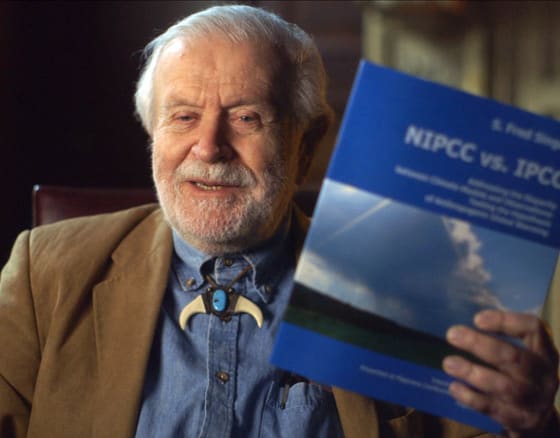Having previously pointed his lens at the dark side of America's corporate food industry in Food Inc., documentary filmmaker Robert Kenner ups the ante with his latest feature-length doc, Merchants of Doubt, by profiling a select group of evil pundits-for-hire and describing the catastrophic damage they can do with just a few short minutes on TV.
Based on the critically acclaimed book by scientific historians Naomi Oreskes and Erik Conway (the former of whom plays a prominent role in the film), Merchants of Doubt traces the career paths of a select number of charismatic, morally damaged individuals whose main job is the following: present themselves as scientific authorities; spread mass confusion through the media; distract society from what's really going on.
Beginning at Big Tobacco, the film branches out, describing why these terrible tactics have been employed again and again across recent history, with the same faces periodically reappearing and purposefully confusing consumers (and the courts) about the effects of global warming (the petroleum industry), dieting (the self-help and pharmaceutical industry), flame retardants (the tobacco industry, in what accounts for this film's most shocking segment) and more.
During its best moments, Merchants of Doubt creates what feels like the cinematic equivalent of a Venn diagram, with each of its distinct subjects overlapping perfectly and revealing one big crooked cover-up. In its worst, the film can feel like a conversation with a conspiracy theorist, with information shooting out too quickly and loosely from all corners, leaving little room to connect all the dots together.
Such is the result of a mostly scientific film discussing political power plays and all others sorts of nefarious activities, and for the most part the film pulls off presenting this information perfectly. The only downside is that, at times, Kenner decides to cleanse the viewers' palette after particularly intense acts with a short (but annoying) segment from a magician explaining the ways in which one can deceive an audience through sleight of hand and misdirection. It feels like the film wants to give viewers a break when the tension gets a little too high, when in reality all they want is the opposite; if anything, with levels of information this illuminating, Merchants of Doubt leaves viewers wanting more, and that's a good thing.
(Mongrel Media)Based on the critically acclaimed book by scientific historians Naomi Oreskes and Erik Conway (the former of whom plays a prominent role in the film), Merchants of Doubt traces the career paths of a select number of charismatic, morally damaged individuals whose main job is the following: present themselves as scientific authorities; spread mass confusion through the media; distract society from what's really going on.
Beginning at Big Tobacco, the film branches out, describing why these terrible tactics have been employed again and again across recent history, with the same faces periodically reappearing and purposefully confusing consumers (and the courts) about the effects of global warming (the petroleum industry), dieting (the self-help and pharmaceutical industry), flame retardants (the tobacco industry, in what accounts for this film's most shocking segment) and more.
During its best moments, Merchants of Doubt creates what feels like the cinematic equivalent of a Venn diagram, with each of its distinct subjects overlapping perfectly and revealing one big crooked cover-up. In its worst, the film can feel like a conversation with a conspiracy theorist, with information shooting out too quickly and loosely from all corners, leaving little room to connect all the dots together.
Such is the result of a mostly scientific film discussing political power plays and all others sorts of nefarious activities, and for the most part the film pulls off presenting this information perfectly. The only downside is that, at times, Kenner decides to cleanse the viewers' palette after particularly intense acts with a short (but annoying) segment from a magician explaining the ways in which one can deceive an audience through sleight of hand and misdirection. It feels like the film wants to give viewers a break when the tension gets a little too high, when in reality all they want is the opposite; if anything, with levels of information this illuminating, Merchants of Doubt leaves viewers wanting more, and that's a good thing.
